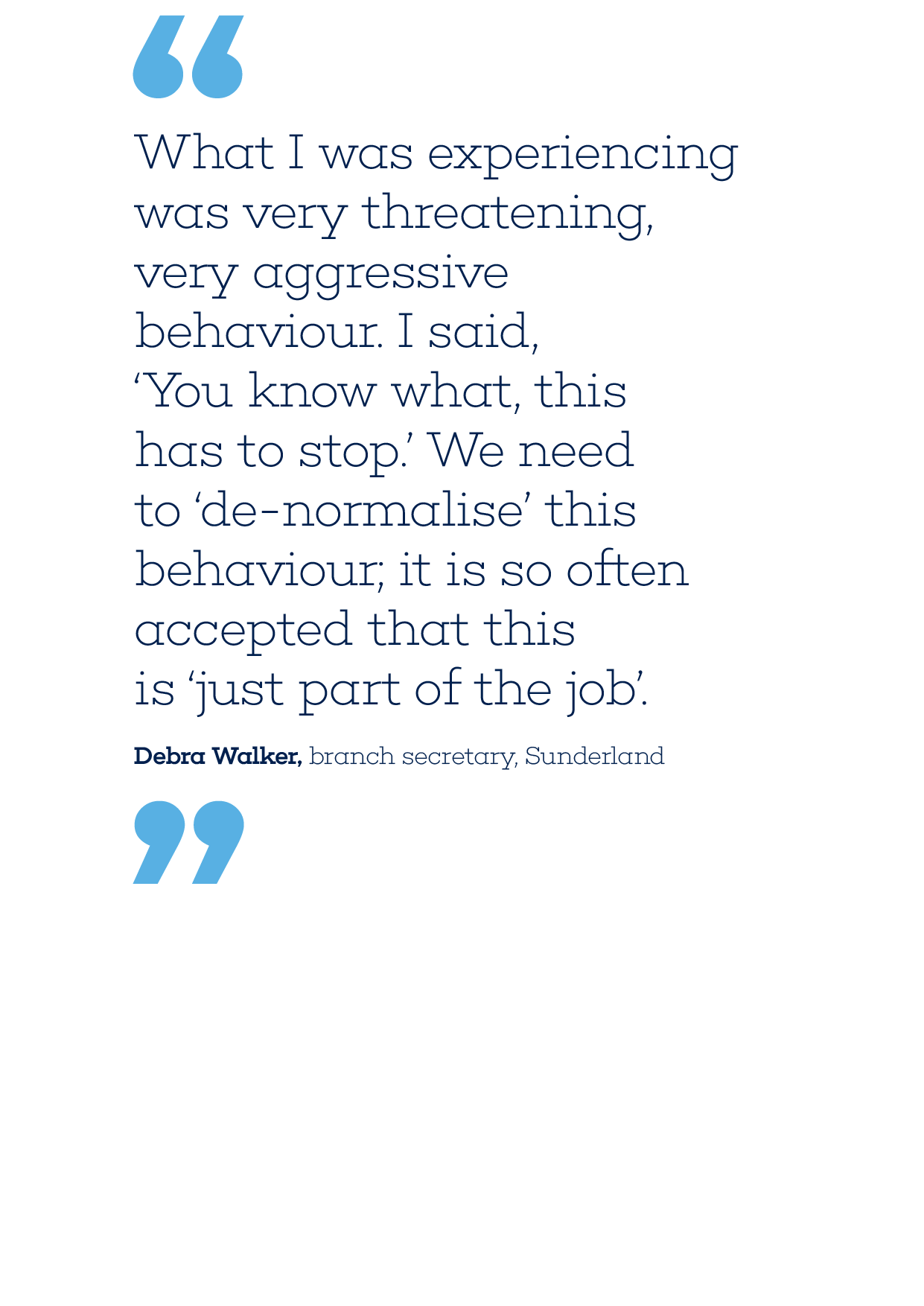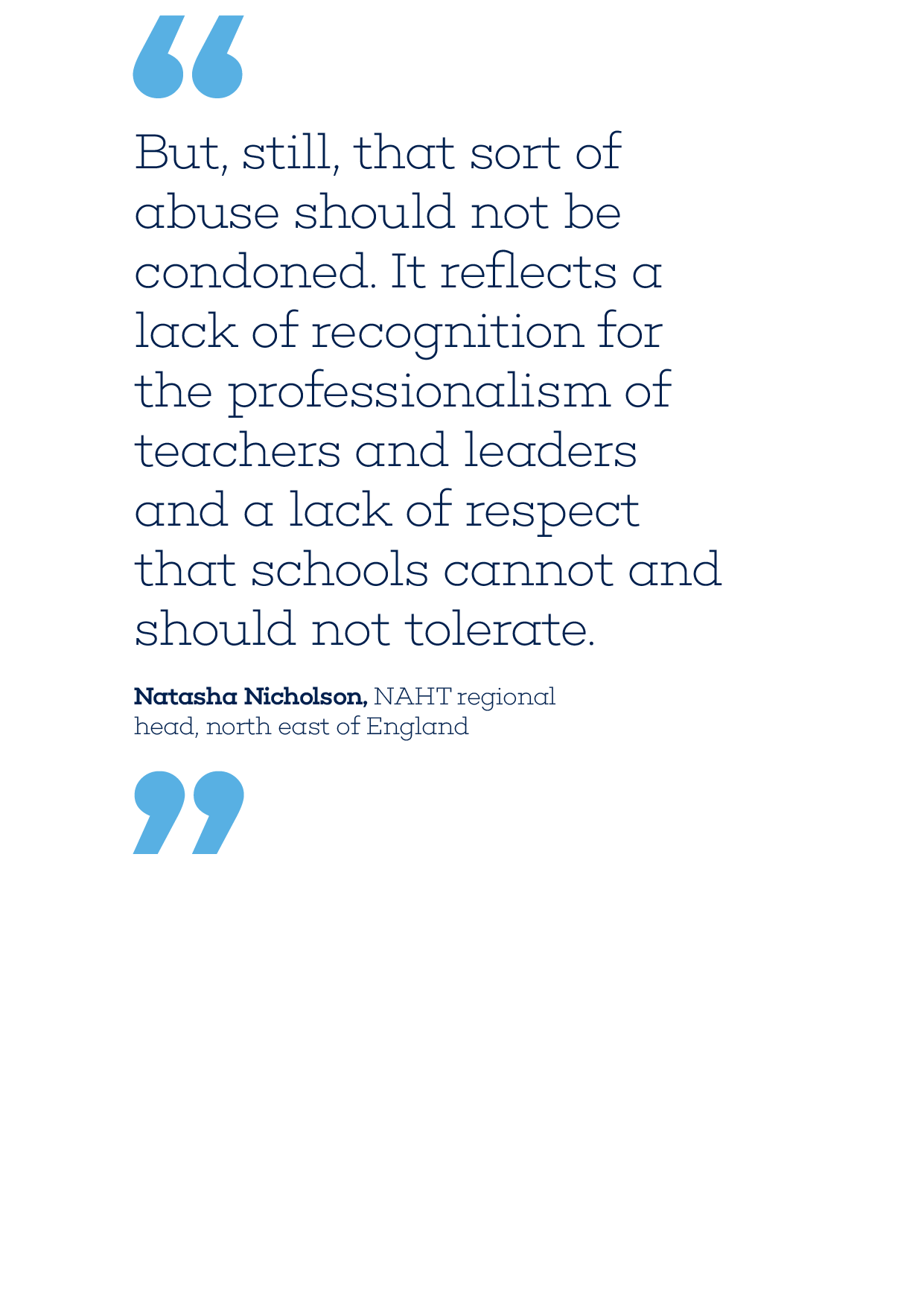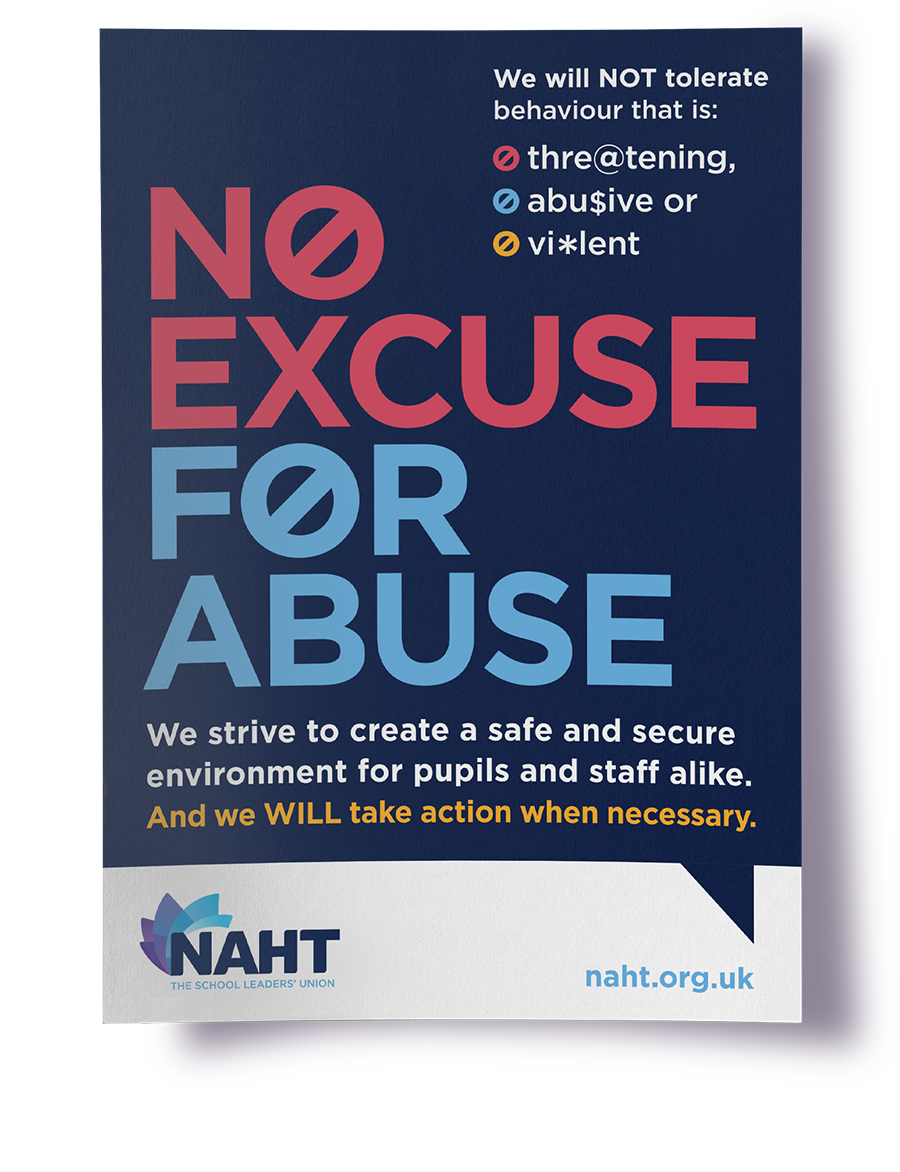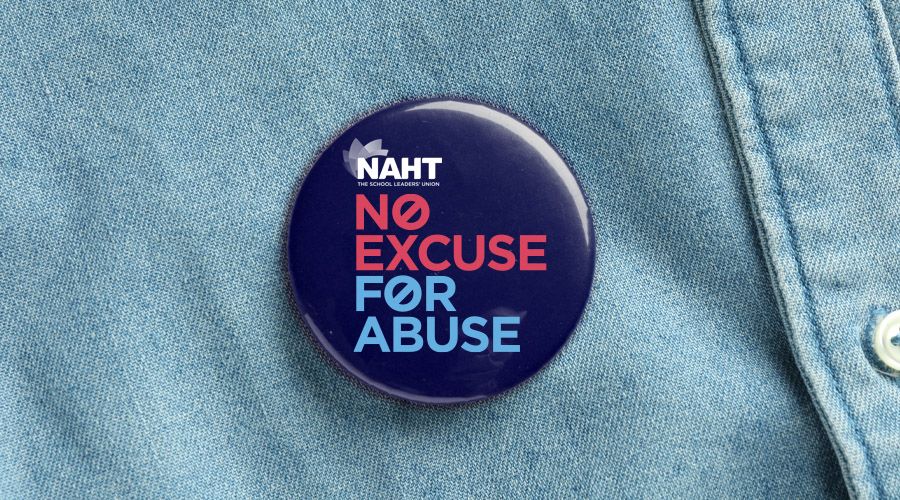NAHT Sunderland’s
‘No excuse
for abuse’ campaign
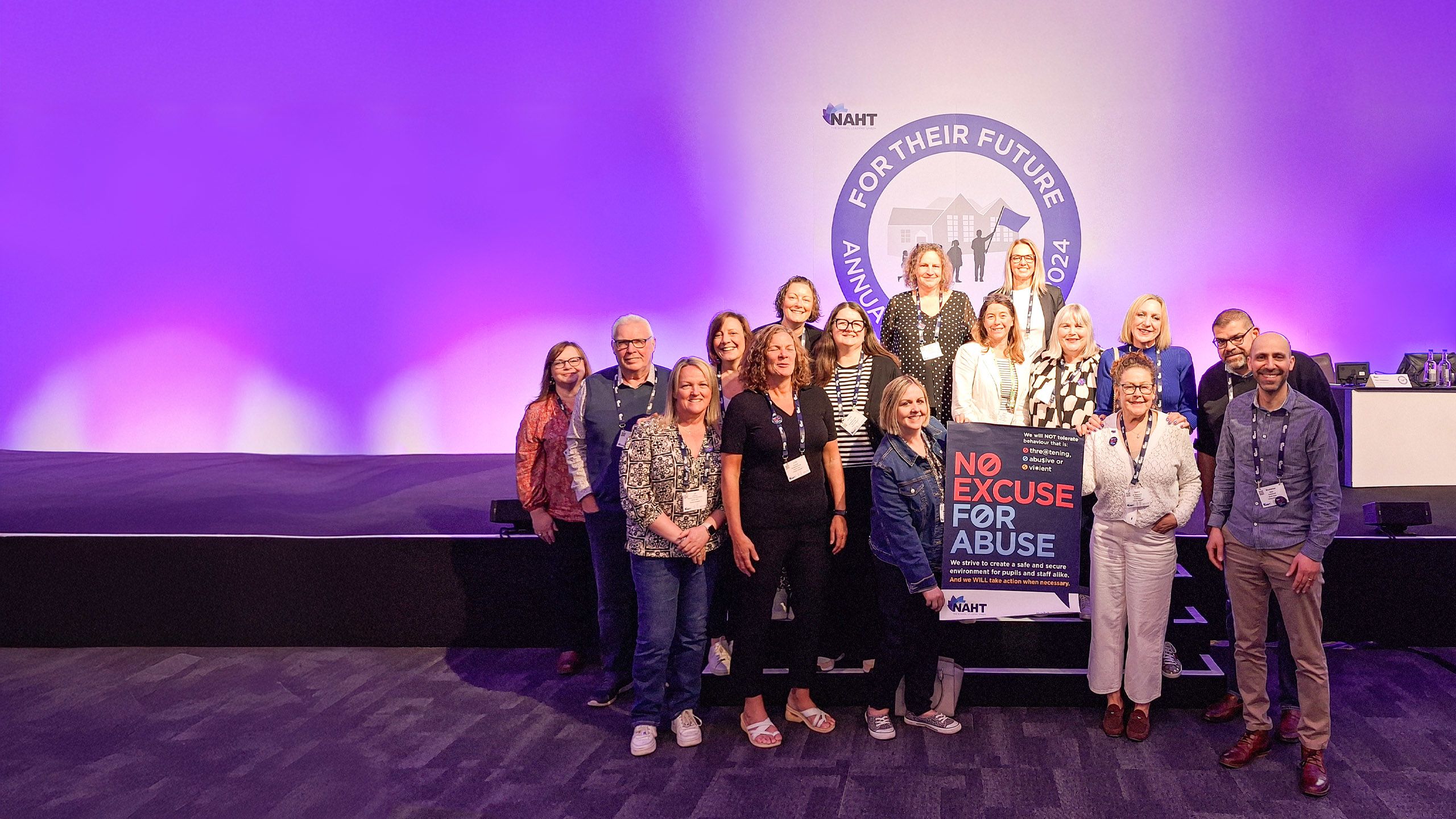
Journalist Nic Paton examines the NAHT Sunderland branch’s response to the alarming rise in parental abuse toward school staff since the covid-19 pandemic. The branch’s ‘No excuse for abuse’ campaign is central to its efforts, empowering school leaders and staff to stand up against abusive behaviour and promote a culture of respect in schools.
‘NO EXCUSE FOR ABUSE’
Rising parental
abuse against school staff
A call for action
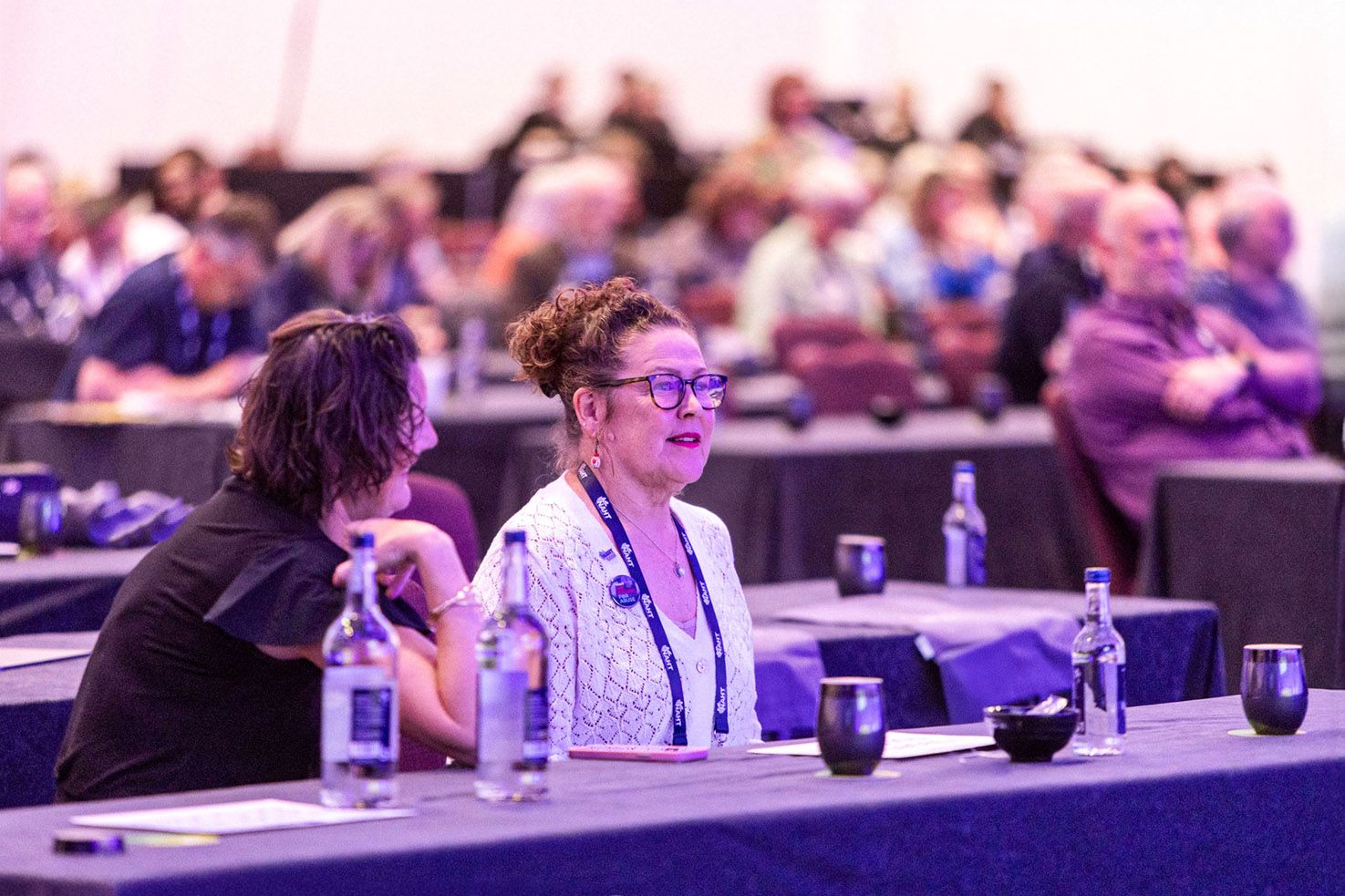
Last year, a survey by the popular teachers’ app Teacher Tapp found that the number of school staff who have been on the receiving end of abuse from parents and carers had risen sharply since the covid-19 pandemic, from 28% in 2020 to 36% at the end of 2023.
Head teachers, Teacher Tapp also found, were the most likely to have abuse hurled at them by parents (75%), followed by other senior leaders (53%) and classroom teachers (30%). One in five teachers said they had experienced abusive emails or messages from parents, with a similar proportion reporting experiencing verbal abuse.
Many public-facing workplaces – hospitals, train stations and the like – display very visible ‘zero tolerance to abuse’ posters. Within teaching, however, the response too often seems to be either a put-up-and-shut-up shrug of the shoulders or an equally ineffectual: “They’re parents; there’s nothing we can do.”
Yet, as a recent survey and campaign by NAHT’s Sunderland branch have shown, school leaders and teaching staff do not need to suffer in silence from this sort of behaviour, and NAHT, as a union, will support members who do stand up and say to parents: “Enough is enough.”
Last year, a survey by the popular teachers’ app Teacher Tapp found that the number of school staff who have been on the receiving end of abuse from parents and carers had risen sharply since the covid-19 pandemic, from 28% in 2020 to 36% at the end of 2023.
Head teachers, Teacher Tapp also found, were the most likely to have abuse hurled at them by parents (75%), followed by other senior leaders (53%) and classroom teachers (30%). One in five teachers said they had experienced abusive emails or messages from parents, with a similar proportion reporting experiencing verbal abuse.
Many public-facing workplaces – hospitals, train stations and the like – display very visible ‘zero tolerance to abuse’ posters. Within teaching, however, the response too often seems to be either a put-up-and-shut-up shrug of the shoulders or an equally ineffectual: “They’re parents; there’s nothing we can do.”
Yet, as a recent survey and campaign by NAHT’s Sunderland branch have shown, school leaders and teaching staff do not need to suffer in silence from this sort of behaviour, and NAHT, as a union, will support members who do stand up and say to parents: “Enough is enough.”
‘NO EXCUSE FOR ABUSE’
The need
for balance
Addressing parental abuse in schools
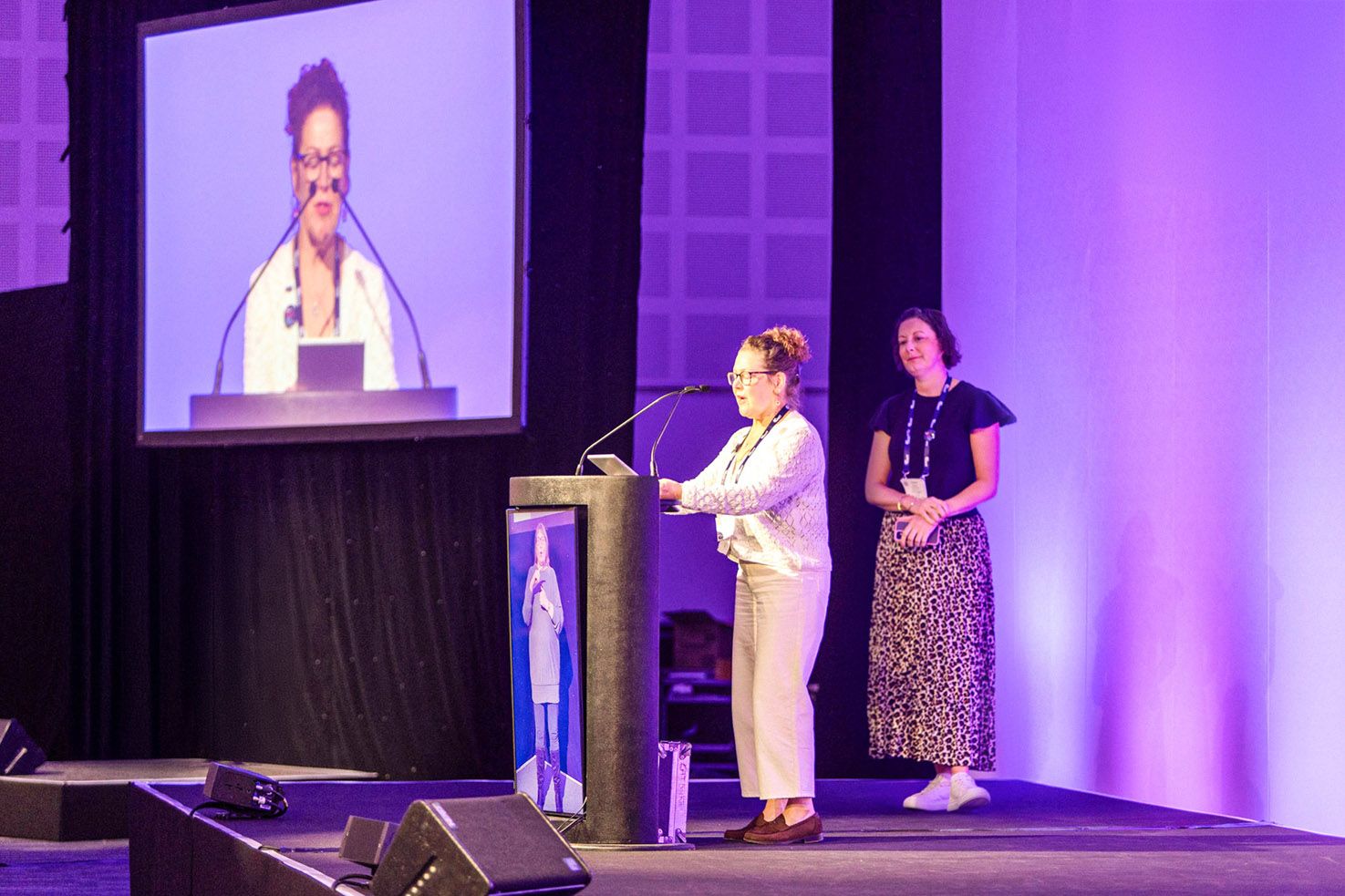
DEBRA WALKER,
BRANCH SECRETARY, SUNDERLAND
Sunderland’s campaign came into being at one of its twice-termly branch meetings in the autumn of last year, as branch secretary Debra Walker recalls. “I’d heard at our first meeting reports from members of an increase in abuse from parents generally. Then, at the second meeting, it came up again, and because I was in the midst of dealing with some abusive behaviour myself – I’m a chief executive officer of a small trust in the north east – it really resonated,” she tells Leadership Focus.
“What I was experiencing was very threatening, very aggressive behaviour. I said, ‘You know what, this has to stop.’ We need to ‘de-normalise’ this behaviour; it is so often accepted that this is ‘just part of the job’. But it isn’t behaviour we should be tolerating from anyone, nor should we be modelling acceptance of that sort of behaviour,” Debra adds.
Schools and school leaders often ‘put up and shut up’ because they fear upsetting or damaging the vital parental-school relationships they need within their communities.
That’s understandable, of course, but as both the anecdotal evidence from Sunderland and the data being gathered by Teacher Tapp and others showed, parental abuse and bad behaviour have become a growing menace for many schools, especially since the covid-19 pandemic.
NATASHA NICHOLSON,
NAHT REGIONAL HEAD, NORTH EAST OF ENGLAND
“There is an element that it is part of that knock-on effect from not just covid-19 but also the years of austerity and neglect that have left many communities struggling,” agrees Natasha Nicholson, NAHT regional head for the north east of England.
“People can’t get the health or social care they need, either for themselves or their children; schools are, too often, the last professional service standing in a community. With the cost-of-living crisis, they can be struggling financially. So, you can understand why they are often at the end of their tether – angry, frustrated and taking it out on school staff.
“But, still, that sort of abuse should not be condoned. It reflects a lack of recognition for the professionalism of teachers and leaders and a lack of respect that schools cannot and should not tolerate,” she adds.
“The last thing any school leader wants to do is ruin the relationships they have with their community,” agrees Debra. “So, yes, it is about striking a fine balance. But at the same time, school leaders need to protect themselves and their team members from what can often be quite frightening abuse. We should quietly, professionally be saying ‘No.’”
DEBRA WALKER,
BRANCH SECRETARY, SUNDERLAND
Sunderland’s campaign came into being at one of its twice-termly branch meetings in the autumn of last year, as branch secretary Debra Walker recalls. “I’d heard at our first meeting reports from members of an increase in abuse from parents generally. Then, at the second meeting, it came up again, and because I was in the midst of dealing with some abusive behaviour myself – I’m a chief executive officer of a small trust in the north east – it really resonated,” she tells Leadership Focus.
“What I was experiencing was very threatening, very aggressive behaviour. I said, ‘You know what, this has to stop.’ We need to ‘de-normalise’ this behaviour; it is so often accepted that this is ‘just part of the job’. But it isn’t behaviour we should be tolerating from anyone, nor should we be modelling acceptance of that sort of behaviour,” Debra adds.
Schools and school leaders often ‘put up and shut up’ because they fear upsetting or damaging the vital parental-school relationships they need within their communities.
That’s understandable, of course, but as both the anecdotal evidence from Sunderland and the data being gathered by Teacher Tapp and others showed, parental abuse and bad behaviour have become a growing menace for many schools, especially since the covid-19 pandemic.
NATASHA NICHOLSON,
NAHT REGIONAL HEAD, NORTH EAST OF ENGLAND
“There is an element that it is part of that knock-on effect from not just covid-19 but also the years of austerity and neglect that have left many communities struggling,” agrees Natasha Nicholson, NAHT regional head for the north east of England.
“People can’t get the health or social care they need, either for themselves or their children; schools are, too often, the last professional service standing in a community. With the cost-of-living crisis, they can be struggling financially. So, you can understand why they are often at the end of their tether – angry, frustrated and taking it out on school staff.
“But, still, that sort of abuse should not be condoned. It reflects a lack of recognition for the professionalism of teachers and leaders and a lack of respect that schools cannot and should not tolerate,” she adds.
“The last thing any school leader wants to do is ruin the relationships they have with their community,” agrees Debra. “So, yes, it is about striking a fine balance. But at the same time, school leaders need to protect themselves and their team members from what can often be quite frightening abuse. We should quietly, professionally be saying ‘No.’”
‘NO EXCUSE FOR ABUSE’
Dealing with
parental abuse
Insights from the Sunderland survey

The Sunderland branch carried out a survey of members to gauge the scale of the problem. While relatively small in terms of respondent numbers, the findings clearly showed parental abuse was becoming a growing problem for members, with many also struggling to know how best to respond.
“The survey included space for open-text responses, and we had members saying things like, ‘I felt like giving up,’ ‘I’m going to resign,’ ‘I’m not sleeping at night,’ ‘I’m frightened to go in the car park’ and ‘I’m avoiding going into local shops in case I meet people,’” says Debra.
“We had members from all sorts of different schools – in prosperous areas and deprived – reporting email or face-to-face harassment, or being shouted at and screamed at, often right in the face.
“I heard one story of a teacher, eight months pregnant, being screamed at in the yard by a parent. The next day, the parent came in and apologised, but that’s not the point. We need a culture where we can say, ‘No, that’s not acceptable,’” Debra adds.
The evidence, therefore, was compelling, but what to do next? The team discovered an NAHT campaign originally from 2017 called ‘No excuse for abuse’. While this had been more focused on zero tolerance of abuse generally and the need to create ‘safe, kind and inclusive’ environments, it was clear it had the potential to be repurposed into something more focused on parental abuse.
The branch downloaded the posters, made some ‘No excuse for abuse’ badges and submitted a motion to NAHT’s May 2024 Annual Conference in Newport, Wales – see the panel at the end for more on this.
“It was really quite emotional, the way it resonated with members at the conference, with everybody in the room. There was even a cheer that went up, with people clapping and standing up and saying things that they had probably never said out loud before,” recalls Debra.
“People were coming up to us and saying, ‘Can we have 10 badges, please?’ or ‘Can we have 20 badges?’ So, we handed out all our badges very quickly! I was quite overwhelmed by the response, to be honest. We all knew we felt the same, but up to then, we had never felt able to say anything because of the fear of damaging relations with our communities,” she adds.
“What came out, both at the conference and in the earlier conversations, was that people often felt like they were the only ones experiencing this. That it was happening because of something they must have done wrong,” agrees Natasha.
“Our motion gave people the empowerment and freedom to go, ‘Oh, actually, I thought it was just me, but it isn’t’ – that parental abuse is becoming an epidemic in schools, almost like a new pandemic in its reach.
“The motion is now part of NAHT policy, and it also went to the Trades Union Congress, where a motion at its conference in the autumn called for the protection of school staff alongside abuse of other public sector workers,” Natasha adds.
The Sunderland branch carried out a survey of members to gauge the scale of the problem. While relatively small in terms of respondent numbers, the findings clearly showed parental abuse was becoming a growing problem for members, with many also struggling to know how best to respond.
“The survey included space for open-text responses, and we had members saying things like, ‘I felt like giving up,’ ‘I’m going to resign,’ ‘I’m not sleeping at night,’ ‘I’m frightened to go in the car park’ and ‘I’m avoiding going into local shops in case I meet people,’” says Debra.
“We had members from all sorts of different schools – in prosperous areas and deprived – reporting email or face-to-face harassment, or being shouted at and screamed at, often right in the face.
“I heard one story of a teacher, eight months pregnant, being screamed at in the yard by a parent. The next day, the parent came in and apologised, but that’s not the point. We need a culture where we can say, ‘No, that’s not acceptable,’” Debra adds.
The evidence, therefore, was compelling, but what to do next? The team discovered an NAHT campaign originally from 2017 called ‘No excuse for abuse’. While this had been more focused on zero tolerance of abuse generally and the need to create ‘safe, kind and inclusive’ environments, it was clear it had the potential to be repurposed into something more focused on parental abuse.
The branch downloaded the posters, made some ‘No excuse for abuse’ badges and submitted a motion to NAHT’s May 2024 Annual Conference in Newport, Wales – see the panel at the end for more on this.
“It was really quite emotional, the way it resonated with members at the conference, with everybody in the room. There was even a cheer that went up, with people clapping and standing up and saying things that they had probably never said out loud before,” recalls Debra.
“People were coming up to us and saying, ‘Can we have 10 badges, please?’ or ‘Can we have 20 badges?’ So, we handed out all our badges very quickly! I was quite overwhelmed by the response, to be honest. We all knew we felt the same, but up to then, we had never felt able to say anything because of the fear of damaging relations with our communities,” she adds.
“What came out, both at the conference and in the earlier conversations, was that people often felt like they were the only ones experiencing this. That it was happening because of something they must have done wrong,” agrees Natasha.
“Our motion gave people the empowerment and freedom to go, ‘Oh, actually, I thought it was just me, but it isn’t’ – that parental abuse is becoming an epidemic in schools, almost like a new pandemic in its reach.
“The motion is now part of NAHT policy, and it also went to the Trades Union Congress, where a motion at its conference in the autumn called for the protection of school staff alongside abuse of other public sector workers,” Natasha adds.
JAMES BOWEN,
NAHT ASSISTANT GENERAL SECRETARY
“What was very clear to see at our Annual Conference was how much this motion resonated with members across all nations,” agrees NAHT assistant general secretary James Bowen.
“This issue is not entirely new, and NAHT has been pressing the government to do more for quite a few years, but there is a clear sense that things have worsened since the covid-19 pandemic. Too many members tell us that what were once rare, isolated incidents are now all too commonplace.
“The motion passed at conference commits us to build on the brilliant work that has already been happening in Sunderland and to extend that nationally,” he adds.
This commitment to extend nationally was actioned during the autumn through NAHT carrying out a bigger national survey of members to try to get a handle on the scale of the problem.
As James puts it: “The survey will give us a clearer picture of the scale and nature of the issues our members are dealing with. It will give us clear evidence to use both through our media work and our work with the government, with the ultimate and clear aim being to reduce the abuse our members are reporting drastically.”
‘NO EXCUSE FOR ABUSE’
Initiatives to
combat parental
abuse in schools
A call for zero tolerance

While the feedback is still being analysed, it is hoped the findings will feed into the development of a wider national campaign, the details of which are still being firmed up. One idea being worked on, however, is a zero-tolerance ‘commitment pledge’ that schools will be able to display, much like you see at train stations, in hospitals or in GP surgeries.
“We appreciate everyone is under more pressure and we’ve had the cost-of-living crisis; as school leaders, we don’t exist in a vacuum. We know everyone is having a tough time,” says Debra.
“But, if anything, that is even more of a reason to stand up and say ‘No.’ Because saying it’s just down to what’s going on in communities simply excuses the behaviour. Most employers in other public-facing sectors already don’t accept this, so why should teaching and education?” she adds.
Debra also points to her success in using her local legal support to generate what she terms a ‘gently legal’ letter banning abusive parents from her school premises for a period of time.
“The shame for parents of being banned from the premises, for example, especially at primary level, can be quite powerful. Just as importantly, it sends a strong message that this isn’t just ‘part of the job’,” she says.
“The main aim of our campaign in Sunderland was simply to start talking about this. Because often, talking about something opens the floodgates. Our campaign was small – posters and badges – but it is already making a difference,” Debra continues.
“For example, I’ve heard of a Yorkshire member wearing one of our badges while a mother and father were shouting in her face. But then the mother suddenly stopped and said to her partner, ‘Come on; we need to go.’ The next day, the mother approached her and said ‘We saw the badge, and you’re right – we shouldn’t have been shouting at you like that,’” she adds.
“Members need to know that even just doing small things can make a difference. Moreover, small local actions can play an even greater role in contributing to that.
“We want people to know they’re not on their own – that there is a range of resources available and other members who will support you; that, as a union, we care about your well-being and support you in standing up to this; that you do not have to put up with or tolerate this; and that, ultimately, there really is no excuse for parental abuse,” Debra concludes.
While the feedback is still being analysed, it is hoped the findings will feed into the development of a wider national campaign, the details of which are still being firmed up. One idea being worked on, however, is a zero-tolerance ‘commitment pledge’ that schools will be able to display, much like you see at train stations, in hospitals or in GP surgeries.
“We appreciate everyone is under more pressure and we’ve had the cost-of-living crisis; as school leaders, we don’t exist in a vacuum. We know everyone is having a tough time,” says Debra.
“But, if anything, that is even more of a reason to stand up and say ‘No.’ Because saying it’s just down to what’s going on in communities simply excuses the behaviour. Most employers in other public-facing sectors already don’t accept this, so why should teaching and education?” she adds.
Debra also points to her success in using her local legal support to generate what she terms a ‘gently legal’ letter banning abusive parents from her school premises for a period of time.
“The shame for parents of being banned from the premises, for example, especially at primary level, can be quite powerful. Just as importantly, it sends a strong message that this isn’t just ‘part of the job’,” she says.
“The main aim of our campaign in Sunderland was simply to start talking about this. Because often, talking about something opens the floodgates. Our campaign was small – posters and badges – but it is already making a difference,” Debra continues.
“For example, I’ve heard of a Yorkshire member wearing one of our badges while a mother and father were shouting in her face. But then the mother suddenly stopped and said to her partner, ‘Come on; we need to go.’ The next day, the mother approached her and said ‘We saw the badge, and you’re right – we shouldn’t have been shouting at you like that,’” she adds.
“Members need to know that even just doing small things can make a difference. Moreover, small local actions can play an even greater role in contributing to that.
“We want people to know they’re not on their own – that there is a range of resources available and other members who will support you; that, as a union, we care about your well-being and support you in standing up to this; that you do not have to put up with or tolerate this; and that, ultimately, there really is no excuse for parental abuse,” Debra concludes.
The ‘No excuse for abuse’ motion
The Sunderland branch’s motion to conference was intended to achieve four key outcomes:

Reduce verbal and physical threats to school staff, which impact their work day and mental health

Rebuild positive, constructive relationships with our school communities

Raise the profile of NAHT within local school communities

Re-establish the professional status of school leaders in a post-covid-19 world
The ‘No excuse for abuse’ motion
The Sunderland branch’s motion to conference was intended to achieve four key outcomes:

Reduce verbal and physical threats to school staff, which impact their work day and mental health

Rebuild positive, constructive relationships with our school communities

Raise the profile of NAHT within local school communities

Re-establish the professional status of school leaders in a post-covid-19 world
It stated that in Sunderland, “Members have expressed, for some time, an increase in verbal and intimidating behaviour against school staff.”
The branch added: “This behaviour is now almost commonplace and, indeed, our school leaders see it as a normal part of their school life. The levels of threat and intimidation from some parents and carers have led to police presence in schools, legal action and high levels of stress and anxiety among school staff.
“In a recent meeting of Sunderland school leaders, all members recalled at least one occasion where a parent’s or carer’s response was disproportionate and abusive.
“Sunderland members, therefore, have launched a campaign called ‘No excuse for abuse’ to raise awareness of this normalisation of threatening behaviour; to empower school leaders to share their experiences and feel less isolated in their roles; and to provide them with the tools to be able to challenge this inexcusable behaviour.
“We call upon conference to follow this approach, working with the Sunderland branch to launch a national campaign on this issue, which is underpinned by the current priorities of workload and well-being and recruitment and retention,” the motion concluded.






